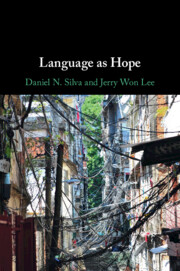Language as Hope
Although it feels like we live in a time of seeming hopelessness, this pioneering book illustrates what language can teach us about the practice, logic, and feasibility of hope in the twenty-first century. Silva and Lee highlight how people living in Brazilian urban peripheries, who have grown accustomed to unrelenting prejudice and violence on an everyday basis, use language to survive and imagine futures that are worth aspiring to. In so doing, this book foregrounds how language becomes a matter of survival for these communities. It provides a thorough theorization of how language can produce conditions of hope, moving away from the idea of language merely as a tool of communication and toward something that can meaningfully impact social realities. Innovative and engaging, it is essential reading for researchers and students in applied linguistics, sociolinguistics, and linguistic anthropology. This title is also available as open access on Cambridge Core.
Daniel N. Silva is a professor at the Universidade Estadual de Campinas – Unicamp, Brazil. His research focuses on language, violence, and hope in Rio de Janeiro’s favelas.
Jerry Won Lee is a professor at the University of California, Irvine. His other books include Locating Translingualism (Cambridge University Press, 2022).
